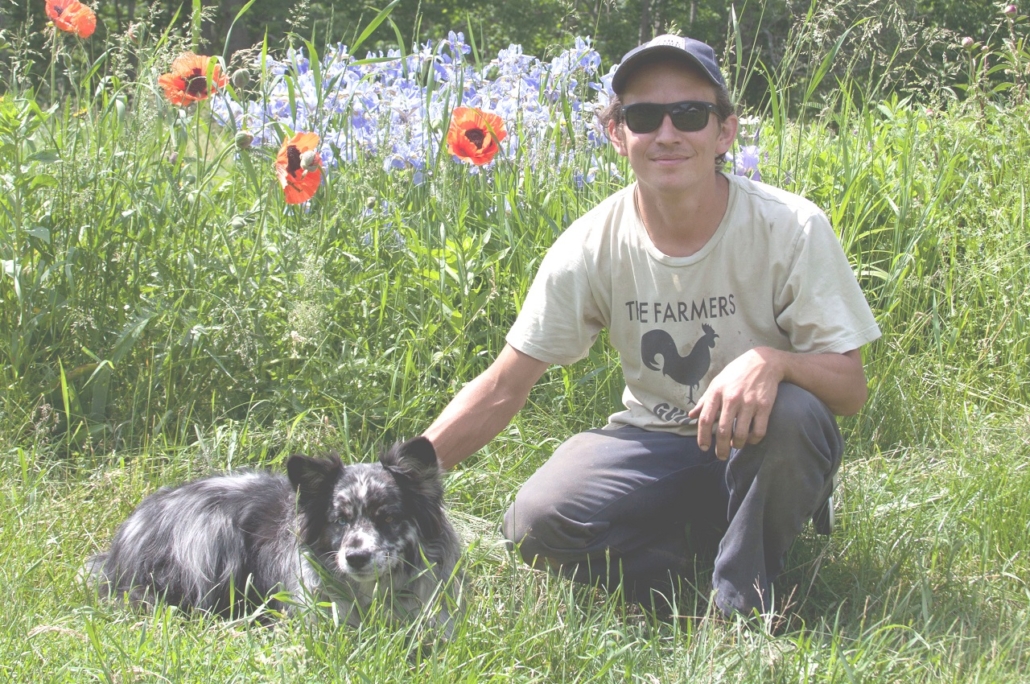
Anson Biller, owner and operator of Full Fork Farm, and his trusted companion. (photo by Sandy Isaac)
U-pick strawberry season is well underway at Full Fork Farm. “It’s probably my favorite part of farming,” said Anson Biller, owner and operator of Full Fork Farm. “Human interaction and watching families have fun as they pick the strawberries is one of the highlights of the growing season.”
Full Fork Farm is a six-acre property located 1.5 miles from the northeast corner of China Lake and has been in operation for four years. Although smaller in size, Full Fork Farm is a great example of how farming and Biller have evolved.
After studying Alternative Education in college, Biller found himself in New York City teaching at a peace and conflict resolution after-school program. One of the skills he taught was how to grow vegetables in a city environment.
Looking for something more, Biller did a job search specifically for the east coast. However, when an opportunity showed up (twice) growing food on a larger scale at a Buddhist retreat center in California, he took it as a sign from the universe and headed west. He worked at the center for two and a half years, but despite enjoying the experience, he wanted to be back in the northeast.
“Maine has a profound sense of community unlike any other place that I have lived. Not Massachusetts, New York nor California. Neighbors support neighbors.” For example, Biller has a new, elongated greenhouse structure on the farm he calls “the tunnel.”
“The tunnel took a few months to put together. The pad had to be leveled, then I hit ledge. I had to rent a pneumatic drill, and the project had to be completed by Spring.” Then help stepped in. “I had a lot of friends and local farmers pitch in. One came with a crew of kids and helped put the plastic (covering) on in one day. We were lucky not to have any wind.”
Shortly after coming back to Maine, Biller joined Maine Organic Farmer Growers Association’s journey-persons program. This two-year program pairs new farmers with more experienced ones, similar to an apprenticeship. MOFGA enables farmers to have a good networking system they call on for advice or help. “Maine is a large state, but all the farmers are very reachable,” said Biller. “Facebook has also proven to be a good source for farmer groups.” These groups not only provide support, but also information on other farming opportunities.
In 2017, Biller wrote a grant as part of the Sustainable Agriculture Research (SAR) educational grant program. The proposal included utilizing spent brewers’ grain (the waste product from a brewery) and using it as nutrition for crops, creating more sustainable fruits and vegetables. Biller said he found the results “interesting” and his produce yield increased by over 25 percent. He writes extensively about it on his blog, found on the Full Fork Farm website. When asked about the grant process, Biller commented, “It was a lot of work, but the SAR program was very helpful. Oxbow Breweries (where Biller works part-time and where he received the byproduct used in his study) is very supportive of my work.”

The sign for Full Fork Farm on the Dutton Road in China. (photo by Sandy Isaac)
Biller says he hopes to write more grants in the future. He would like to extend his research to looking toward natural weed control or examining how carbon dioxide affects crop production. “We need to close the gaps and figure out ways that parts of the farms can interact and benefit from one another, or how different parts of the community of neighboring businesses can work together to be more productive and less wasteful.”
Biller’s philosophy is “Earth care. People care. Resource share.” He believes in “full circle farming,” meaning “seeking to emulate Earth’s natural cycles…and to foster community and regenerate the land in the process.”
One of the ways Biller is doing this is by “seed stewardship.” Seed stewardship is about saving the seeds from the best plants and using them for the next growing season. By doing so Biller hopes to encourage top self-pollinating vegetable varieties that grow best in Maine’s environment and eventually share those seeds with other farmers. Self-pollinating plants do not need the assistance of bees, other insects or the wind for pollination and fruit production. Some self-pollinating vegetables include tomatoes, peppers, eggplants, and peas, all of which are being grown at Full Fork Farm. In addition, Biller is also growing cucumbers, kale, swiss chard, winter squash, salad greens and, of course, strawberries. These selections come from seed purchased locally from companies like Johnny Seeds in Winslow,.
“We also need to be conscious of weather patterns,” Biller said. “We had a very late and cold Spring. This put our growing season behind by about a month. Then there is the flooding out west. Is this the new norm?”
Cultivating native plants that are able to adapt to the local environment and yield the most fruit or vegetables are where farming is headed. This doesn’t have to involve genetic modification, just paying attention to the plants, tracking the results, saving the seeds from the best ones and repeating the process. Biller also hopes to extend the growing season by using the tunnel greenhouse and plans to introduce some winter squash to his produce line up. “Being able to produce healthy vegetables and offer them to people for longer periods of time…that would be ideal, especially for Maine.”
“Our growing season got off to a slow start with the cold, damp Spring, but we are now well underway,” said Biller. “One of the reasons we do U-pick is because there are too many strawberries for me to pick alone,” Biller joked. “The weeding also takes up a lot of time.” Biller hired a college student from Unity College that comes in part-time to help.
The U-pick strawberries are a favorite stop for many reasons. Last year, Biller purchased an ice cream machine that takes plain ice cream and mixes in the fresh strawberries that customers just picked. The result is “the best strawberry ice cream they ever had,” Biller said. “Having conversations, making the ice cream, and being part of this great family and friendly experience makes all the hard work worthwhile.”





 One of central Maine’s most beloved and popular summer events—the annual Blueberry Festival—will dish up its delectable, all-things-blueberry goodness and fun on Saturday, August 10, from 7 a.m. to 1 p.m., at
One of central Maine’s most beloved and popular summer events—the annual Blueberry Festival—will dish up its delectable, all-things-blueberry goodness and fun on Saturday, August 10, from 7 a.m. to 1 p.m., at 



 Don’t miss this first ever intergenerational day on the Kennebec River, in partnership with the Age-Friendly Communities of Augusta, Hallowell and Gardiner, Augusta Downtown Alliance, Vision Hallowell, Gardiner Main Street and AARP Maine. Bring your own canoe, kayak, and equipment. Lifejackets and some paddling experience are required.
Don’t miss this first ever intergenerational day on the Kennebec River, in partnership with the Age-Friendly Communities of Augusta, Hallowell and Gardiner, Augusta Downtown Alliance, Vision Hallowell, Gardiner Main Street and AARP Maine. Bring your own canoe, kayak, and equipment. Lifejackets and some paddling experience are required.
 Unofficial results from Fairfield for the July 23 MSAD #49 school budget validation referendum election, as provided by Christine Keller, town clerk, of the town of Fairfield.
Unofficial results from Fairfield for the July 23 MSAD #49 school budget validation referendum election, as provided by Christine Keller, town clerk, of the town of Fairfield.